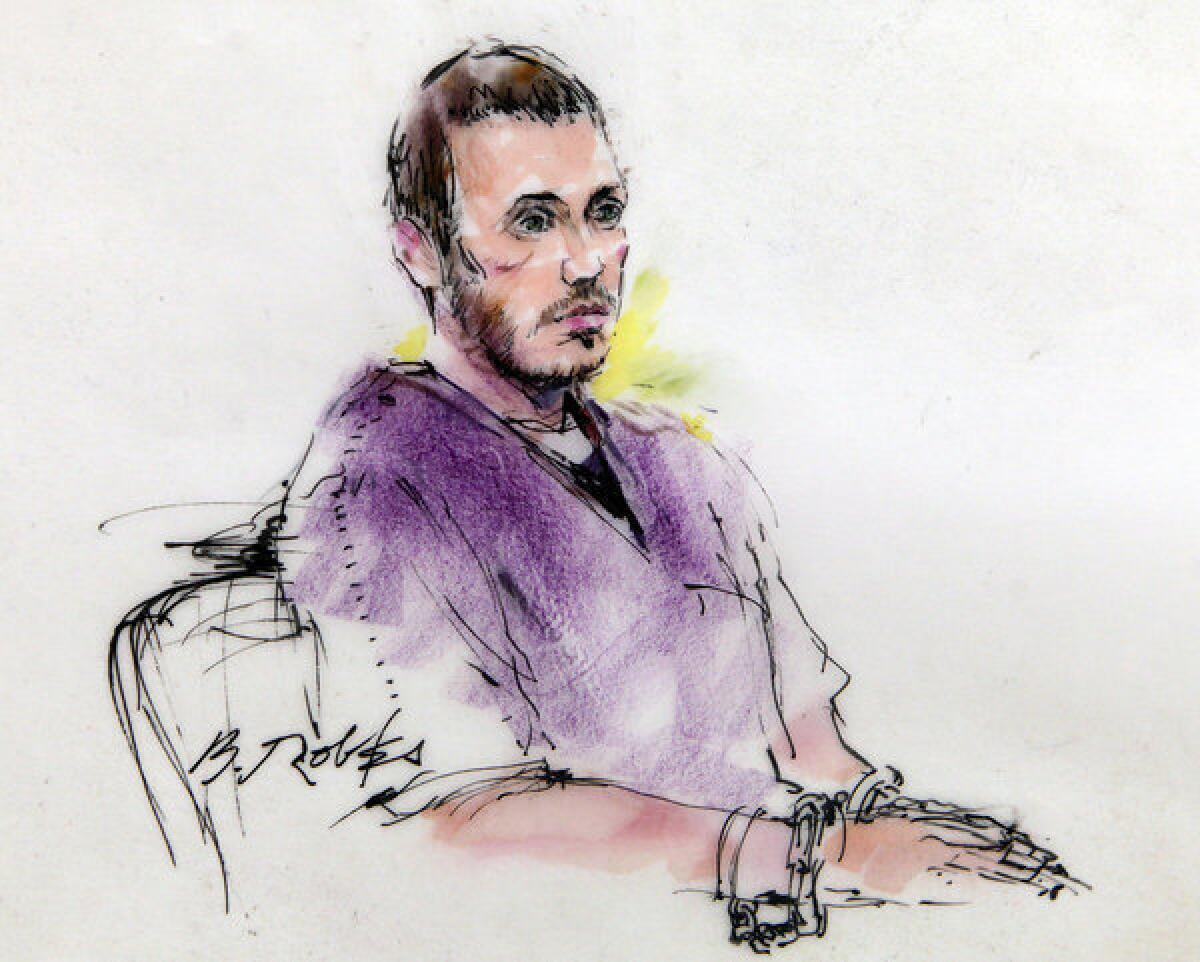School denies it barred Holmes because of threat

- Share via
CENTENNIAL, Colo. — The University of Colorado-Denver stood firm Friday in saying it never barred James E. Holmes from campus, despite newly released court documents that indicate the suspect in the Aurora movie massacre had his student ID card deactivated after he alarmed a school psychiatrist.
Dr. Lynne Fenton told campus police officer Lynn Whitten on June 12 — more than a month before the July 20 rampage that killed 12 and injured 70 — that Holmes had “homicidal thoughts” and might be a danger to the public.
Fenton, director of student mental health services at the university’s Anschutz Medical Campus in Aurora, testified at a pre-trial hearing that she saw Holmes only once, on June 11, and their undisclosed conversation caused her to contact campus police.
A trove of search warrants and Holmes’ arrest affidavit unsealed on Thursday by Judge Carlos A. Samour Jr. now offer clues about Fenton’s encounter with Holmes and what unfolded immediately afterward:
Whitten was interviewed by Aurora police the day after the massacre, court documents say, and she told officers she had deactivated Holmes’ ID on June 12 because of Fenton’s concerns. That barred him from some campus buildings, classrooms and laboratories.
Whitten also told police that Fenton had said Holmes had “threatened and harassed” the psychiatrist with texts and messages after she saw him, the documents said.
What is not clear, however, is what — if any — follow-up occurred between June 12 and July 20. One of the newly released search warrants says only that Fenton contacted Whitten “per her requirement” about “his danger to the public due to homicidal statements he had made.”
Whitten and Fenton remain under a gag order.
For months the university has denied Holmes was barred from campus because of any threats. The deactivation of his ID badge was routine procedure taken when a student withdraws from school, the university has said.
Holmes, a former doctoral student at the school’s elite neuroscience program, failed a key exam on June 7 and began to withdraw from school on June 10.
On Friday the university reiterated in a written statement that not only was Holmes never barred from campus because of a threat, but that the unsealed documents proved it: “These documents support the prior statement from CU that Mr. Holmes was never banned from campus but instead that his student access card was deactivated when he left the program.”
Jacque Montgomery, executive director of media and communications for the university, declined to elaborate or address why the university does not see a contradiction between its statement and the information in the court documents. She said it would be inappropriate to comment further because some people involved may be called as witnesses in a trial.
Still, the revelation that warnings may have gone unheeded is another blow to those who lost family members in the theater. “It is infuriating,” says Scott Larimer of Crystal Lake, Ill., whose son John Larimer was killed in the rampage. “In my opinion they should’ve done more. They should be ashamed that they didn’t.”
Larimer questions why Holmes was not hospitalized for a 72-hour mental health assessment if a psychiatrist was concerned that he might be a danger to others. He also wonders whether the campus officer reported Fenton’s concerns to other officers. “I don’t know if it would’ve mattered,” he said, “but at least they would’ve done something. We’ll never know.”
Among the weaponry Holmes bought after June 12, when Fenton voiced her alarm to Whitten, were a semi-automatic Glock pistol, thousands of rounds of ammunition, gunpowder, military-type gear and explosive devices, according to testimony from a Bureau of Alcohol, Tobacco, Firearms and Explosives supervisor at a January preliminary hearing.
Still, under Colorado law, even if Fenton had ordered Holmes held for a 72-hour involuntary hospitalization in June, it might not have stopped him from buying his arsenal.
A 72-hour hold would not show up on a court document or background check in Colorado, said Kris Miccio, a University of Denver law professor who is not involved in the case. A person found by the courts to be mentally ill is limited or prohibited from buying a firearm, she said.
The bigger question, Miccio said, is not whether the legal ball was dropped but rather whether a moral one was. Even if everyone fulfilled their obligation to report, she wonders if follow-up would have prompted police to question Holmes or search his apartment before the massacre.
“Should the mental health system have kicked in? Should the criminal justice system have kicked in? The answer is probably yes to both,” Miccio said.
Holmes, 25, faces 166 counts of first-degree murder, attempted murder and weapons charges. On Monday, Dist. Atty. George Brauchler of Colorado’s 18th Judicial District said he would seek the death penalty.
More to Read
Sign up for Essential California
The most important California stories and recommendations in your inbox every morning.
You may occasionally receive promotional content from the Los Angeles Times.













